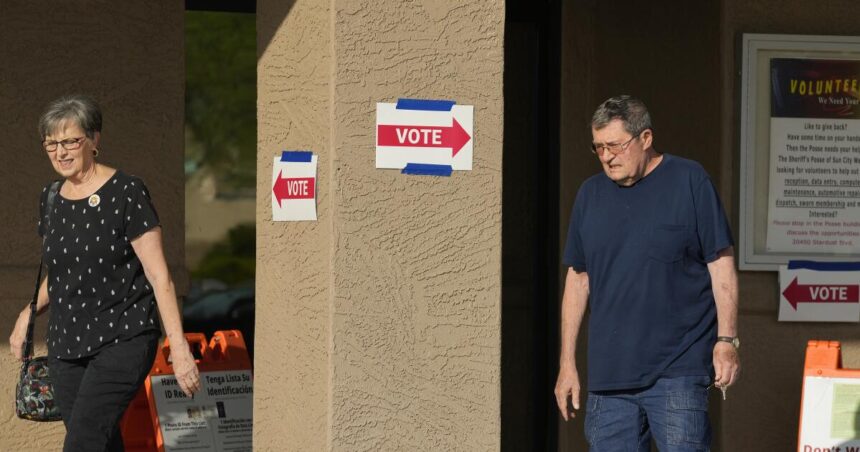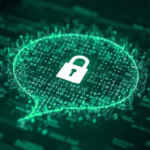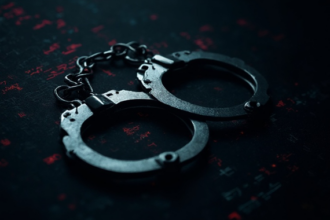The right of about 100,000 Arizonans to vote in state and local elections is now before the courts after election officials said last week they discovered a system error that caused confusion in the battleground state’s voter registration rolls with less than two months until Election Day.
At issue is Arizona’s unique requirement that voters show proof of citizenship in state and local elections, despite little evidence that non-citizens are trying to vote.
Maricopa County Recorder Steven Richer said Tuesday that 97,688 people statewide have not provided proof of citizenship but are still registered to vote on the full ballot.
“All of these people have demonstrated, under penalty of law, that they are U.S. citizens, and they are probably all U.S. citizens,” he said, “but they have not provided documentation of their citizenship.”
Richter, a Republican, filed suit on Tuesday against Arizona Secretary of State Adrian Fontes, a Democrat, over whether the people in question should have access to a full ballot in November’s election. (Arizona has about 4.1 million registered voters, he said.) The issue is urgent, with Arizona set to send out its first ballots to military and overseas voters on Saturday.
“That is why we are in court,” Richer wrote, “to get clear answers.”
Why does Arizona have a proof of citizenship law?
Any eligible American may vote in federal elections by simply proving their citizenship under penalty of perjury. Arizona is the only state in the nation that requires proof of citizenship for everyone who wants to vote in state and local elections.
As a result, Arizonans will be able to fill out one of two forms when registering to vote: as a federal-only voter without proof of citizenship, or as a full-count voter with proof of citizenship.
Arizona’s citizenship saga began in 2004, when 56% of Arizonans passed a bill modeled after California’s. Passed at a time of heightened attention on illegal immigration through border states, the Arizona bill required Arizonans to show proof of citizenship to access many public benefits, including voting.
What was the error?
In Arizona, proof of citizenship has been required to obtain a driver’s license in most cases since 1996, so having a driver’s license was sufficient evidence of citizenship for most Arizonans registering to vote: the state’s voter registration system simply checked whether a voter had obtained a driver’s license after 1996.
But there was a problem with the system.
“Unfortunately, the design of this system meant that some groups of voters were left out,” Richer said in a statement.
Richer gave the example of someone who got a driver’s license in 1992, but lost it in 2012 and got a duplicate license. The system would show the issue date of the renewed license as 2012.
“Then the voter registration system will think you have proof of citizenship on file,” Richer said, “but you actually don’t.”
Richer said the Maricopa County elections officer’s office discovered foreign nationals registered to vote on all ballots last week.
“Although this foreign national had never voted in any previous elections, this discovery prompted an urgent joint investigation by county and state officials,” it said.
“After Recorder Richter reported the erroneous voter registration records to me, my team identified and corrected an administrative error that began in 2004 and affected longtime residents who obtained their driver’s licenses before 1996,” Arizona Gov. Katie Hobbs said Tuesday.
So, what’s next?
Officials said the back-end error has been fixed, but election officials are divided over what to do about the roughly 97,000 Arizonans who are registered to receive all ballots in the November election without showing proof of citizenship.
Secretary Fontes said at a press conference Tuesday afternoon that the majority of voters affected are between the ages of 45 and 60. Republicans are the most likely to vote, followed by independents and Democrats.
Fontes said Arizona should maintain the status quo until after the November election to ensure voters receive complete ballots.
But Richer said legally, those registrants should receive ballots only for the November federal election.
“He and I have different legal views about what should happen here,” Richer said of the “friendly lawsuit” against Fontes’ office.
In Arizona, several key state elections remain uncertain, including a proposed law that violates the state constitution. Both Richer and Fontes are calling on the Arizona Supreme Court to rule as soon as possible.
What should Arizonans do?
Arizona voters can contact the Secretary of State’s office or their local county registrar for instructions. But for now, Fontes said Arizonans should “be patient and wait.” Depending on the court’s decision, voters may not have to do anything, but they may have to show proof of citizenship to vote in state and local elections.
Voters on the list will be contacted soon, Richer and Fontes said, adding that his office is preparing to set up a portal where voters can submit proof of citizenship if a court determines it is necessary before the November election.
Despite the court proceedings, Fontes urged Arizonans to vote early.
The politics of citizenship
Former President Trump rekindled attention to the issue of citizenship-verification voting in recent years, falsely claiming that illegal immigrants were voting in large numbers.
Election officials have repeatedly denied the allegations, and Arizona’s secretary of state said that while foreign nationals sometimes register to vote, it is “extremely rare.”
“This is based on the myth that there are huge numbers of foreign voters and that this might affect the outcome of the election. It’s crazy,” Fontes told The Times in an interview last week. “There’s no data to back this up.”
While Arizona deals with its latest fight over its own rules, House Speaker Mike Johnson (R-Louisiana) is trying to make voting proof a national issue, saying he will attach the SAVE Act, which would require proof of citizenship to vote, to the next congressional spending bill he proposes.
“I urge all of my colleagues to do what the vast majority of people in this county rightly demand and deserve – prevent non-U.S. citizens from voting in U.S. elections,” he wrote.
Johnson tried to do the same thing last week but ultimately ran out of support. Congress must pass a spending bill within the next two weeks to avoid a government shutdown.
That coincides with National Voter Registration Day on Tuesday, amid ongoing confusion over citizenship verification.









